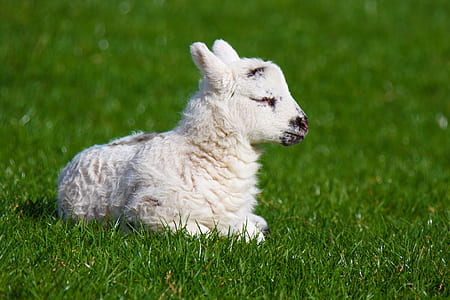“He makes me to lie down in green pastures.” Psalm 23:2a
Sheep can be rather stupid animals. Often times like sheep, we do not always know when to rest. For example, when a flock of sheep should be resting in preparation for a difficult journey, something will excite them – the growl of a mountain lion, the bark of a dog, or the cry of a child. This will bother the sheep and cause them to run back and forth across the pasture. The wise shepherd knows the sheep have a need to rest so he moves into the midst of the flock, catches a sheep and gently forces it to lie down and feed quietly on the cool, green grass. He makes his sheep “to lie down in green pastures.”
The last couple of weeks I have been awakened in the middle of the night with my thoughts racing from one worry to the next. Can any of you relate to this? We live in a hectic, hurried, and harassed world in which headache medicine has become the national beverage. Indeed, we have difficulty resting. We take a day off and feel guilty.
When our Good Shepherd steps into this situation, He often forces us to rest. Our “green pastures” may be the coronavirus which is causing us to simplify our lifestyles right now. We have more time at home. More time to spend with our Good Shepherd. More time to listen to His voice as we read His Word and talk to Him in prayer. More time to spend with our loved ones.
God not only provides physical rest, but spiritual rest, too. But because of our unbelief, we may not realize we are in green pastures. We may focus on the dirt instead of the green grass.
An example of someone who recognized by faith that God was making him to lie down in green pastures during a difficult time, was the apostle Peter. King Herod was harassing some from the church (Acts 12:1). He had just “killed James the brother of John with the sword” (Acts 12:2). When Herod saw that this “pleased the Jews,” he arrested Peter and put him in prison with four squads of Roman soldiers to guard him (Acts 12:3-4). So it looked like Peter would be executed next! But instead of worry keeping Peter awake that night, he slept because he knew his Good Shepherd had led him to green pastures to rest (Acts 12:6).
When we trust the Lord as our Shepherd we will have no want for rest. As you read this article, you may have no rest about where you will be after death. Jesus invites you, “Come to Me, all you who labor and are heavy laden, and I will give you rest” (Matthew 11:28). Notice that Jesus did not say, “Come to Me and I will give you more stress…more guilt… more burdens and more worries.”
Many churches or religions can add to our stress rather than relieve it with their legalistic demands. They tell us that we must perform all of these man-made rules and rituals in order to gain peace with God. But Jesus says that when we come to Him just as we are He will give us spiritual rest. The rest Jesus offers here refers to a state of mind that exists when a non-Christian realizes he or she does not have to earn their salvation. This refers to the positional rest of eternal life that is based on trusting in Christ’s finished work on the cross (John 19:30).
After we come to faith in Christ for His gift of everlasting life, we can begin to experience His rest as we yoke together with Him to go His direction at His pace (Matthew 11:29-30). And as we learn to trust our Good Shepherd, we will have no want for rest.
Prayer: Lord Jesus, thank You for knowing what is best for me. Often times, I do not know when to rest. I allow my fears to quicken my pace instead of turning them over to You. Like a Good Shepherd, You move into my situation to make me lie down in green pastures where I can rest in Your tender loving care. Please help me to recognize by faith the green pastures where You want me to rest. In Jesus’ name. Amen.


